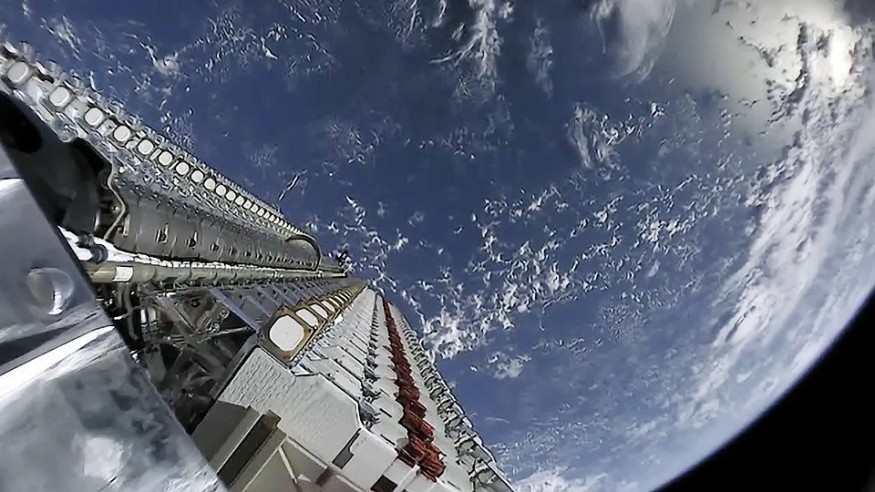The Falcon 9 rocket from SpaceX successfully deployed 60 Starlink satellites into orbit on Sunday morning.
Falcon 9 launched at 6 a.m. from the 39 launch pad at NASA's Kennedy Space Center in Florida, according to SpaceX.
Sunday's mission was the Falcon 9's ninth flight and landing, according to SpaceX. It was part of five previous Starlink flights and the DM-1 mission with its Crew Dragon capsule.
The latest launch from NASA's Kennedy Space Center was SpaceX's second in many days, after another of its Falcon 9 rockets was launched from the Cape Canaveral Space Force Station on Thursday.
The next Starlink launch from Cape Canaveral is tentatively scheduled for March 21st.
Deployment of 60 Starlink satellites confirmed pic.twitter.com/AMLK4R9dMn
— SpaceX (@SpaceX) March 14, 2021
SpaceX Falcon 9 Launch: How Did It Launch The New Starlink Satellites?
The Falcon 9 rocket is the first fleet to fly and land nine times. According to New13, the two-stage rocket lifted off from Pad 39A at NASA's Kennedy Space Center in Florida at 6:01 a.m. EDT.
The recycled rocket's first stage returned to Earth about 9 minutes later, attempting its 9th landing on SpaceX's drone ship "Of Course I Still Love You."
Falcon 9’s first stage has landed on the Of Course I Still Love You droneship, completing the ninth flight of that booster
— SpaceX (@SpaceX) March 14, 2021
The flight came just days after SpaceX's previous attempt, which saw a Falcon 9 rocket launch from Space Launch Complex 40 at the Cape Canaveral Space Force Base.
The weather forecasters at the 45th Weather Squadron expected perfect weather conditions for launch when the Falcon 9 lit up the night sky in Florida. The only thing that worried me was the possibility of cumulus clouds.
Because of the shape of the clouds produced, the launches are frequently mistaken for UFOs. The B1051 booster is one of two reusable rockets in SpaceX's stable, with more than seven flights under its belt.
According to Space.com, the first one took to the sky in March 2019. It delivered an autonomous Crew Dragon spacecraft to the International Space Station for a demonstration mission.
Following the first flight, B1051 flew cross-country to SpaceX's Vandenberg Air Force Base in California to launch three satellites for Canada.

CNet said the B1051 traveled five times from Florida in 2020, carrying five separate Starlink missions and a broadband satellite for Sirius XM.
What is Starlink?
The satellites are part of SpaceX's growing Starlink constellation.
Starlink is a satellite-based internet constellation that seeks to cover the globe with high-speed broadband.
According to CNN, the company would bind billions of people who still don't have access to the internet.
To provide continuous coverage, satellites' swarms in low-Earth orbit - approximately 340 miles high in SpaceX's case - are required.
About 1,000 Starlink satellites have been launched, with SpaceX planning to expand Starlink to over 40,000 satellites.
That's five times the cumulative number of satellites deployed by humans before spaceflight began.
SpaceX currently operates about a third of all operational satellites in orbit.
The Verge said Federal Communications Commission authorized the corporation to launch 12,000 satellites as part of the program.
How to Subscribe for Starlink Service?
Starlink's beta service, which began last year, has accumulated 10,000 subscribers.
The Starlink package costs $499 and includes a router and antenna and a $99 monthly fee with internet speeds of 70 to 130 Mbps.
Last month, the company launched pre-orders for Starlink in the United States, Canada, and the United Kingdom for a $99 deposit fee.
Users may sign up for the service by entering their email address and home address on the Starlink website.
RELATED ARTICLE : Experts Reveal That 3% Of SpaceX's Starlink Satellites Have Failed In Orbit So Far
Check out more news and information on SpaceX on Science Times.












